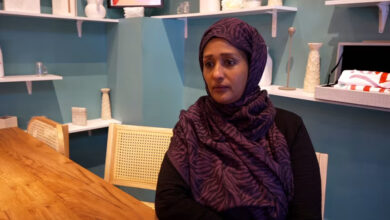
Egyptian-American playwright Yussef El Guindi has received one of America’s most prestigious theater awards: a US$25,000 “new play award” from the American Theatre Critics Association.
At the end of March, Guindi won the Steinberg/ATCA award for “Pilgrims Musa and Sheri in the New World,” a smart and layered romantic comedy that had its world premiere in Seattle, Washington, last summer.
After the Steinberg/ATCA announcement, Guindi described his appreciation for the award to The Seattle Times, saying it was “like being handed a bottle of water in a marathon run.”
In an email interview with Egypt Independent, he added, “Yes, forever running. Running mostly to catch up with what I expect from myself. So yes, I am working on a couple of projects. One of them is called ‘The Mummy and the Revolution.’ It’s a comedy/farce which takes as its starting point the recent revolution in Egypt.”
Guindi left Egypt when he was 3 years old. But he says that “Egypt will remain a part of me — a large part of me — whether I like it or not. And generally speaking, I like it.”
The playwright comes from a celebrated artistic family: His grandmother was the actress and publisher Rose al-Youssef, his grandfather was the director Zaki Toleimat, and his uncle was the writer Ihsan Abdel Koudous, who saw many of his books adapted to films.
Although Guindi grew up in London — seeing “many plays by the likes of Pinter, Orton, Stoppard, Hare, Shaffer, Bond, Brenton, etc.” — he returned to the American University in Cairo as an undergraduate. There, he said, he was engaged in the theater scene and acted in something every semester.
“I originally wanted to become an actor,” he said.
After graduation, Guindi moved to the US. In Seattle in 1996, he dashed any potential presidential hopes for his offspring by getting American citizenship. After that, he said, his work began to reflect his “immigrant” experience.
The award-winning “Pilgrims Musa and Sheri in the New World” does just that. It is a wonderfully funny romance with an undertow of serious issues: the long-term prospects of cross-cultural love, and the meaning(s) of religion and foreignness. Guindi has a particular talent for finding his characters’ individual voices and respecting each character in his script.
“Pilgrims Musa and Sheri in the New World” is also a very American play, as ultimately it’s about the desire to find oneself. And it’s optimistic: The romance between the sweet but duplicitous Egyptian cab driver, Musa, and the neurotic but thoughtful American waitress, Sheri, is unlikely, but it’s not doomed. The audience is left with a hopeful ending.
“I see myself as writing in the tradition of the quintessential American narrative,” Guindi says, “which is primarily the immigrant narrative. That has been my life experience.”
Guindi’s work often takes being Arab and American as a point of both humorous and serious departure. In his “Language Rooms” (2010), an Arab-American translator at a detention center begins to suspect that he’s under surveillance, and in “Jihad Jones and the Kalashnikov Babes” (2009), an Arab-American actor has to choose between his integrity and a breakthrough film role playing an evil terrorist.
Two of Guindi’s plays, based on short stories by Salwa Bakr, have been staged in Cairo. But his other works have not made it back to Egypt.
“Of course I would love to see my plays staged in Cairo,” he says. “But my other plays — a lot of them — also contain frank sexuality, and I fear that might not get by the censors.”
Guindi, who has now won numerous theater awards, says that his work “will always be refracted through the prism of my Egyptian background.”
He adds: “No one gets to jettison off their history that easily!”




